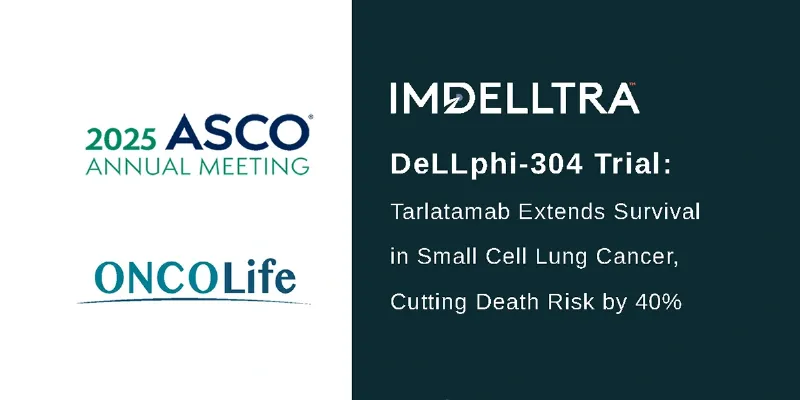Imdelltra Extends Survival in Small Cell Lung Cancer, Cutting Death Risk by 40%

2 June 2025
The Phase 3 DeLLphi-304 trial data presented at ASCO 2025 showed that Imdelltra® (tarlatamab-dlle) reduced the risk of death by 40% in relapsed small cell lung cancer (SCLC), extending median overall survival (OS) to 13.6 months compared to 8.3 months with chemotherapy. These emerging data herald a potential paradigm shift in SCLC care, with Imdelltra also demonstrating a manageable safety profile.
Transformative Potential
Amgen announced new interim results from the global Phase 3 DeLLphi-304 trial at the 2025 ASCO Annual Meeting, showing that Imdelltra® (tarlatamab-dlle) significantly prolongs survival compared to standard-of-care (SOC) chemotherapy in patients with relapsed or refractory SCLC. The data, simultaneously published in the NEJM, demonstrated that tarlatamab is a first-in-class bispecific T-cell engager immunotherapy targeting DLL3 on SCLC cells and CD3 on T cells. This approach leverages an immune-driven mechanism of action that sets it apart from traditional cytotoxic treatments.
The DeLLphi-304 trial enrolled 509 patients worldwide who had progressed after platinum-based chemotherapy, randomizing them to receive either tarlatamab or SOC chemotherapy—primarily topotecan, lurbinectedin, or amrubicin, depending on local standards. Median follow-up was approximately 11 months for both arms.
Dr. Charles Rudin, deputy director at Memorial Sloan Kettering Cancer Center, underscored the significance of these findings: “The data from DeLLphi-304 mark a major milestone for people with relapsed small cell lung cancer. Tarlatamab is associated with significant improvements in both OS and PFS over standard chemotherapy in patients with recurrent or progressive disease. This study also provides confirmatory data on management of potential toxicities associated with bispecific T-cell engager therapies in a large patient cohort.”
Survival Gains That Challenge the Status Quo
The interim analysis, which met the trial’s predefined criteria for statistical significance, revealed a median overall survival (OS) of 13.6 months in the tarlatamab arm, compared to just 8.3 months with SOC chemotherapy—a striking absolute benefit of more than five months. The hazard ratio for death was 0.60 (95% CI: 0.47–0.77; P<0.001), representing a 40% relative reduction in mortality risk.
Beyond OS, tarlatamab also demonstrated a significant improvement in progression-free survival (median PFS: 4.2 vs. 3.7 months; HR, 0.71; P<0.001), and improved patient-reported outcomes, including cancer-related dyspnea and cough—common and debilitating symptoms in this patient population.
"Small cell lung cancer is an extraordinarily aggressive and difficult-to-treat disease, and those living with SCLC often experience limited benefit with first line treatment," said Dr. Jay Bradner, EVP, Research and Development, at Amgen. “These data underscore Imdelltra's potential to transform patient outcomes and the small cell lung cancer treatment paradigm.”
Safety Profile: A Manageable Risk
Notably, tarlatamab’s tolerability profile emerged as another compelling feature of the regimen. Grade 3 or higher treatment-related adverse events occurred in 27% of patients receiving tarlatamab, compared to 62% in the chemotherapy arm. Discontinuations due to adverse events were also lower with tarlatamab (3% vs. 6%). Cytokine release syndrome (CRS), a known risk with T-cell engager therapies, was generally low-grade (42% Grade 1; 13% Grade 2; 1% Grade 3) and manageable, with no grade 4 or 5 CRS events reported.
A New Target in the Spotlight: DLL3
Imdelltra’s precision hinges on DLL3, a protein highly expressed in SCLC (~85–96% of cases) but minimally present in healthy tissues. This selective expression allows tarlatamab to redirect T cells specifically against cancer cells, forming a cytolytic synapse and inducing tumor cell lysis. Such specificity not only underpins the survival advantage seen in DeLLphi-304 but also points to a broader shift in SCLC treatment strategy: from non-specific cytotoxic chemotherapy to targeted immunotherapeutic precision.
Implications for Clinical Practice
Pending regulatory updates, the DeLLphi-304 results are poised to cement Imdelltra as a new standard of care in second-line SCLC, replacing chemotherapy for eligible patients. They also provide crucial confirmatory evidence supporting tarlatamab’s accelerated approval in this setting, opening the door for its integration into treatment guidelines.











Comments
No Comments Yet!